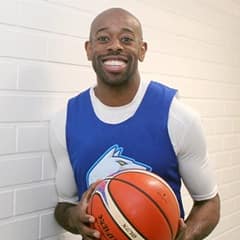What is Sports Management?

Understanding the numbers
When reviewing job growth and salary information, it’s important to remember that actual numbers can vary due to many different factors—like years of experience in the role, industry of employment, geographic location, worker skill and economic conditions. Cited projections are based on Bureau of Labor Statistics data, not on SNHU graduate outcomes, and do not guarantee actual salary or job growth.
Some love sports. Some love challenges and taking chances. These traits, together, make a winning combination for a career in sports management, which includes any and every business aspect of sports and recreation.

"(Sports management is) the engine behind your favorite games, tournaments and athletic organizations," said Dr. Enrique Barreiro, a senior associate dean of business at Southern New Hampshire University (SNHU) with more than two decades of strategic leadership experience. The work can be fast-paced, rewarding and built around a love of sports, he said.
And the field is vast. Sports managers work for professional teams, their parent programs (such as the National Football League, National Basketball Association, Major League Baseball or National Hockey League), colleges and universities, recreational departments and sports marketing firms. They can be event managers, facility managers, sports economists, financial, promotion or information experts.
They can run the front office, work behind the scenes or act as the interface between players, coaches and the media. In all these sports management roles, energy, motivation, good sportsmanship and teamwork are considered strong assets.
There’s more to a job in sports management than first meets the eye. Getting these coveted jobs takes hustle, of course, but also demands excellent analytical thinking, strong communication skills and standout business savvy.
Here’s a closer look at what sports management is all about and how to choose a degree program that best matches your goals.
What Are the Types of Sports Management?
Maybe you’re an athlete yourself or just a zealous fan. Earning a sports management degree can introduce you to the field and various roles that need people ready to turn their passion into a profession.
This range of careers that sports management encompasses is one of the field's highlights, according to Barreiro, who is an active member of the North American Society for Sport Management and the Academy of Management.
"Whether you're into the action on the field or the strategy behind the scenes, there's a role that fits your strengths," he said.
The sports industry is growing. The U.S. Bureau of Labor Statistics (BLS) predicts 99,700 job openings annually in entertainment and sports careers between 2024 and 2034.* Expansion can mean opportunities for well-trained, business-minded professionals at all levels.
You can choose from a number of sports management careers focused on marketing, facilities management, event planning and more. BLS projected that the employment of public relations specialists, a vital role within the sports management world, will increase by 5% through 2034.*
In addition to public relations, other directions you might consider with a sports management education include:
- Athletic director
- Facilities manager
- Guest relations specialist
- Sales or promotions manager
- Special events coordinator

So, What is a Sports Management Degree?
A sports management degree is a credential you're awarded after successfully completing a college program that explores the fundamentals of sports management.
Barreiro noted that a sports management degree at an accredited university can help you build a solid foundation for work in the field. There are several programs you can choose from to get started:
- Bachelor's in sports management or a bachelor's in business administration with a concentration in sports management
- Accelerated bachelor’s to master’s degree in sports management
- Master’s in sports management or a Master of Business Administration (MBA) in Sports Management
Those with at least a bachelor’s degree in sports management should have the industry knowledge and practical experience to get ahead in these careers. The bachelor’s in sports management program at SNHU, for example, combines sports management, business and liberal arts courses — plus opportunities for valuable field experiences — to help you enter and succeed in this competitive job arena.
In a sports management program, you can:
- Become well-versed in ethical conduct principles and values, and learn to express yourself with professionalism in any business setting
- Explore a global view of sports business by developing a deep understanding of the relationships between institutions, culture and humanity and their impact on sports businesses
- Learn to apply conventional analytical tools to sports business situations
- Recognize and understand the broad spectrum of relationships among external forces affecting a sports business and how to respond by aligning company strategies and resources
A college degree also connects you with a strong network of alumni who work for sports organizations around the country, from pro franchises and sports apparel giants to amateur athletic organizations.

Tatiana Toledo ’21, a lifelong athlete, didn’t want to give up on sports after sustaining back injuries. So, when she learned she could combine concepts of both business and sports, she said it was a "dream come true."
A month before completing her bachelor’s in sports management at SNHU, Toledo accepted a job offer in sales, recruiting for an organization that supports college coaches in their search for student-athletes. Working on a team of business and communication majors, Toledo said her sports-specific degree has helped her stand out as a knowledgeable professional.
“This program allowed me to learn so much about the sports world, whether it was about operations, marketing, sales, ethics, etc.,” Toledo said. “I am so happy I picked this program because it changed my view on the sports industry forever and allowed me to connect with other people in my classes who loved sports as much as me.”
Find Your Program
Keep the Ball Rolling with a Graduate Degree
If you've decided to turn your love of sports into a fulfilling career, you might consider a master’s degree. A master’s degree can help you stand out, and some roles may require you to have the advanced credential.
Master of Science in Sports Management
A master’s degree with a focus on sports management can provide the knowledge needed to break into or advance in the competitive sports management industry by blending experiential learning with a strong foundation in business administration.

Laura Cappelli '22G wanted to make an impact in hockey operations or youth hockey development. Since she worked in education and already held bachelor’s degrees in both finance and management, she knew that a master's in sports management would give her the knowledge required to make a leap to the sports industry.
Cappelli was working full-time, so she needed a program that allowed her to balance school, work and her personal life. "I was also coaching a youth sports team, and having flexibility for my learning was a big help in allowing me to follow my passions at the same time," she said.
After completing the graduate degree at SNHU, Cappelli was all eyes ahead. "Adding a master’s degree to my resume has been a big accomplishment for me, and I believe it will help me land more interviews and potential job opportunities in the future," she said.
Key components of the master's in sports management program at SNHU include:
- Analyzing interrelationships between functional areas in sports business organizations
- Applying management and leadership theory in a sports-related environment
- Honing strong written and verbal communication skills
- Integrating strategic analysis into planning processes
- Thinking critically and creatively
Coursework can cover research methods, management of sports organizations, sports marketing and media. You can expect to explore both theory and real-world application and enter the workforce with practical tools you can use immediately.

A professional athlete abroad for the past 15 years, Jamar Wilson ’21G wanted the opportunity to push the sports industry forward. So, he decided to go back to college for a master's in sports management. Although he was nervous to return to school after more than a decade away, he managed to earn a 4.0 GPA throughout his online courses at SNHU.
“I was able to confidently excel in all areas, finding time to do my assignments when (the) time suited,” Wilson said.
The graduate credential, in conjunction with his years of playing experience, was just what Wilson needed to help build upon his knowledge of the sports business and launch himself into new opportunities. “Most importantly, my confidence in the sports world has elevated because of my time in the program,” he said.
MBA in Sports Management
If you want to master the business side of sports, an MBA equips you with what you need to make your mark. You’ll study the core principles of business development, brand building and event planning. You’ll also gain a solid foundation in business and management using real-world examples from the multi-billion-dollar sports business.
MBA coursework explores specific aspects of business and is a well-rounded education, whether you’re just starting out, wanting to move up or are ready for a career change.
Here are some important lessons your MBA will instill:
- An understanding of the relationships between institutions, culture and society, and their impact on businesses
- Core business skills, from strategic planning to research analysis, alongside a strong foundation in the principles of business
- Strategic perspectives in the industry with a focus on international business, licensing, marketing, sales and strategic alliances
Master's degree holders can expect to earn significantly more, on average, than those with only a bachelor's degree, according to BLS. For example, in 2024, master’s degree holders earned a weekly median of $1,840, which is $297 more than bachelor’s degree holders and $910 more than those with just a high school diploma.*
So, is Sports Management a Good Career?
Whether you’re a player strategizing your next move or someone who consumes all things sports from the sidelines, you can fuel your passion with a career in sports management. It’s also a path that can instill and maintain that same passion in others.

“As I grew up, I realized what a profound (effect) sport has on people and knew it was something I wanted to be a part of,” said Dr. Michael Newhouse-Bailey, a senior associate dean of academic effectiveness at SNHU. Before this role, Newhouse-Bailey established his career in intercollegiate athletics communications, including as a producer for a local sports television show.
“Sport is often described as a universal language, and it can speak to people no matter where you are from or what your background is," he said. "Its impact to shape society and provide a sense of connection to communities is what keeps me excited about this field."
No matter what position you land in the sports industry, versatility is a must. When employers list "other duties as assigned" in the job description, Newhouse-Bailey said they mean it.
"A huge part of working in this field is event management and ensuring that customers have a positive experience,” he said. “This leads to a lot of problem-solving and doing a lot of work that isn’t very glamorous.” You might need to put on the mascot costume or relay statistics to the media, among other tasks that need to be done, but Newhouse-Bailey said that’s what makes working in the field fun.
With the introduction and increasing popularity of esports, there’s even more to look forward to.
If you’re ready to dive headfirst into the field, a sports management degree can position you for success and open you to career opportunities. You’ll need to show you’re serious, though; Newhouse-Bailey recommends you “get involved early and often” and build a resume and professional network you can leverage when you’re ready. You can also take advantage of sports management internships to boost both.
“You need to be willing to jump at opportunities in this field when you get the chance," said Newhouse-Bailey.
Discover more about SNHU’s online sports management degree: Find out what courses you'll take, skills you’ll learn and how to request information about the program.
*Cited job growth projections may not reflect local and/or short-term economic or job conditions and do not guarantee actual job growth. Actual salaries and/or earning potential may be the result of a combination of factors including, but not limited to: years of experience, industry of employment, geographic location, and worker skill.
Rebecca LeBoeuf Blanchette '18 '22G is a writer at Southern New Hampshire University, where she fulfills her love of learning daily through conversations with professionals across a range of fields. She earned her Bachelor of Arts in Communication with a minor in Professional Writing at SNHU’s campus in Manchester, New Hampshire, and followed her love of storytelling into the online Master of Arts in English and Creative Writing at SNHU. Connect with her on LinkedIn.
Explore more content like this article

For Jazzmen Shipp, Earning a Degree Changed Everything

How Kellsie Goodhart-Jones Earned an MBA While Working for the US Air Force

What Jobs Can You Get with a Business Degree?
About Southern New Hampshire University

SNHU is a nonprofit, accredited university with a mission to make high-quality education more accessible and affordable for everyone.
Founded in 1932, and online since 1995, we’ve helped countless students reach their goals with flexible, career-focused programs. Our 300-acre campus in Manchester, NH is home to over 3,000 students, and we serve over 135,000 students online. Visit our about SNHU page to learn more about our mission, accreditations, leadership team, national recognitions and awards.


